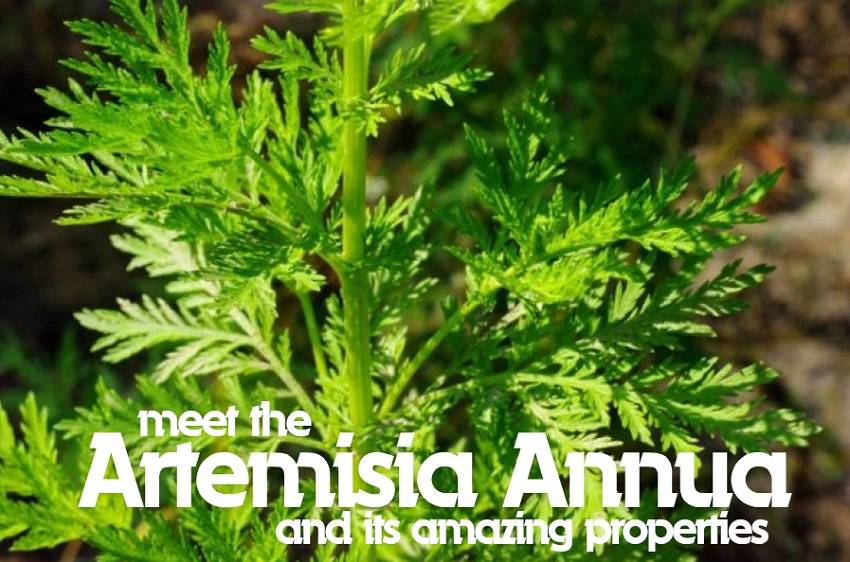Artemisinin Effects, Health Benefits and Uses
 Artemisinin is a lactone derived from the Artemisia annua plant. This plant’s common plant name is sweet wormwood or Qing Hao in Traditional Chinese Medicine.
Artemisinin is a lactone derived from the Artemisia annua plant. This plant’s common plant name is sweet wormwood or Qing Hao in Traditional Chinese Medicine.
It has been used for at least 2,000 years to treat fevers, including Malaria. It is currently used for this purpose in modern medicine.
Artemisinin is being researched for cancer fighting properties. Artemisinin is observed to target cancer cells, but leaves the other healthy cells intact.
Artemisinin and its derivatives are also robust anthelmintics (expels parasitic worms and other internal parasites). It is used to treat African-sleeping sickness caused by an infected tsetse fly bite and Onchocerciasis, River Blindness which is caused by the bite of an infected black fly.
You can find out more about these conditions and maps of the regions affected on the WHO (World Health Organization) website.
This supplement is also purported to have anti-aging applications, to support the immune system and has restorative properties for febrile conditions.
Artemisinin Uses
For short trips into malaria areas, Artemisinin is taken a few days before and after being in the affected area.
The recommended dose is 100 mg to 200 mg three times a day. This can be taken in a tincture or tablets.
If in the malaria zone area longer than a few days, ACT (artemisinin combination therapies) is recommended. This helps prevent single ingredient resistance that can develop over time.
These ACTs containing an artemisinin component and a partner drug which has a long half-life, such as mefloquine (ASMQ), lumefantrine (Coartem), amodiaquine (ASAQ), piperaquine (Duo-Cotecxin), and pyronaridine (Pyramax).
For parasite infections 1 or 2 capsules of 100 mg each should be taken twice a day before mealtimes.
For its use in cancer treatment regimes, lower amounts of 150 mg daily have been beneficial, but the exact effective human dosage is still being studied. Artemisinin showed anti-cancer properties in experimental models of hepatocellular carcinoma, (HCC), the most common form of liver cancer.
It is thought when Artemisinin’s peroxide lactone group in its structure comes into contact with high iron concentrations – a natural component in cancerous cells – it forms free radicals that are toxic to the integrity of the invading cells. It breaks them down and leaves the infected cells destroyed.
Health Benefits of Artemisinin
Artemisinin has also been shown to reduce angiogenesis, which is the formation of new blood vessels. In cancer, tumors release chemicals that cause new blood vessels to grow and supply it with nutrients to increase in size and replicate.
This supplement also reduces the expression of vascular endothelial growth factor (VEGF) in some tissue cultures. VEGF is a signal protein produced by cells that stimulates vasculogenesis, oxygen supply to tissues when blood circulation is inadequate and angiogenesis.
 Artemisinin and Artemisia Annua supplements have been traditionally used for liver problems, joint pain and loss of appetite, epilepsy and menstrual problems.
Artemisinin and Artemisia Annua supplements have been traditionally used for liver problems, joint pain and loss of appetite, epilepsy and menstrual problems.
It has sedative and anti-inflammatory properties. It calms the nerves and muscles and helps insomnia.
It also reduces inflammation swelling and pain and is used to treat gastrointestinal issues such as IBS and Dyspepsia. For these conditions, 100-200 milligrams taken per day is the suggested amount of supplement.
It is also an antibacterial and is used to treat ulcers, wounds and skin conditions. It helps prevents infection and breaks down existing infections and helps fortify the healthy cells.
The Antiviral Activities of Artemisinin and Artesunate study published in the Clinical Infectious Disease Journal Volume 47, Issue 6 in 2008 concluded this supplement caused the inhibition of certain viruses, such as human cytomegalovirus (HCMV) and other members of the Herpesviridae family (e.g., herpes simplex virus type 1 and Epstein-Barr virus), hepatitis B virus, hepatitis C virus, and bovine viral diarrhea virus.
HCMV is a major cause of disease in immuno-compromised individuals, such as those with AIDS and transplant recipients, and it is a cause of congenital infection that leads to developmental problems and hearing loss.
Artemisia Side Effects
Some side effects of this supplement include:
- Abdominal cramps
- Darkening of urine
- Decreased reticulocytes (immature red blood cells)
- Dizziness
- Fever
- Nausea
- Pruritus (itching) and skin rashes
- Somnolence (drowsiness)
- Sweating
- Tinnitus
- Transient low fever
- Vomiting
Cardiovascular symptoms are associated with acute over dosage of this supplement. This supplement should be avoided if pregnant and for cardiac and hypertension patients.
Some diabetic patients in trials have developed hypoglycaemia after taking Artemisinin extract. It should not be taken with grapefruit juice as it may increase its bioavailability (degree and rate it is absorbed).
It can also interact with antacids, sucralfate, proton pump inhibitors, and histamine-receptor antagonists. It may also decrease the effectiveness of anti-seizure medications.
Artemisinin has many applications as a supplement from global conditions of malaria and parasite treatment, to treating pain and inflammation. It also boosts the immune system compromised by febrile conditions. Its potential as an anti-cancer treatment that targets and destroys cancer cells and leaves the healthy cells intact is continuing to be studied.
By: Nootriment Editorial Staff
